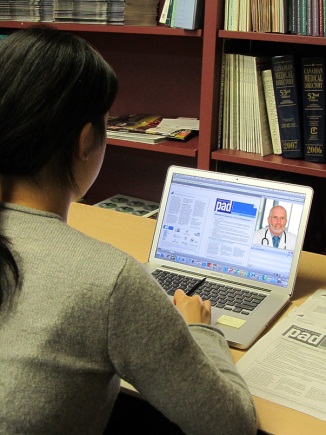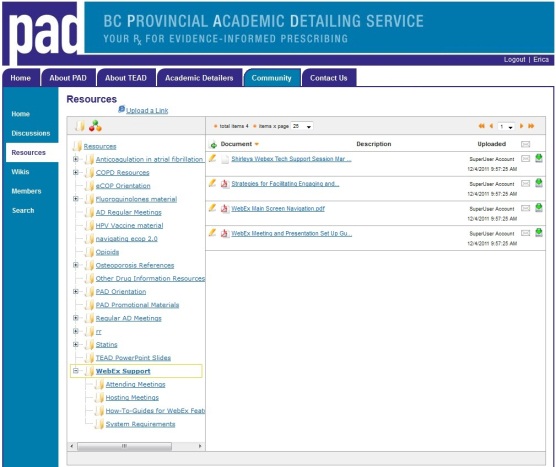Academic Detailing in BC
 Academic detailing is a form of inter-professional knowledge exchange in which a pharmacist visits physicians and other health care professionals (one-on-one or in small groups) to provide objective, balanced, evidence-informed drug information.
Academic detailing is a form of inter-professional knowledge exchange in which a pharmacist visits physicians and other health care professionals (one-on-one or in small groups) to provide objective, balanced, evidence-informed drug information.
The BC Provincial Academic Detailing (PAD) service, launched in March 2008, uses academic detailing to provide an opportunity for health care professionals to participate in detailed discussions and to work together to optimize best prescribing practices.
Technology Enabled Academic Detailing (TEAD)
 The eHealth Strategy Office is collaborating with PAD to implement TEAD to support and enhance traditional face-to-face academic detailing in two ways:
The eHealth Strategy Office is collaborating with PAD to implement TEAD to support and enhance traditional face-to-face academic detailing in two ways:
- Live Web-Conferencing: Academic detailing session conducted via live Web-conferencing provides an alternative method for connecting with health care professionals, enabling academic detailers to reach a larger number of participants and participants in remote or hard to reach areas.
- Electronic Community of Practice (eCOP) – currently under development: An online community in which academic detailers and participants can share information and resources, ask questions, and discuss therapeutic issues between academic detailing sessions. Visit bcpad.ca for more information.
History of TEAD
From 2005 to 2007, the eHealth Strategy Office collaborated with the BC Community Drug Utilization Program and pharmacists from the Vancouver Coastal Health, Fraser Health, Interior Health and Northern Health Authorities, on a Canadian Institutes of Health Research (CIHR) funded project to examine the feasibility of TEAD versus traditional academic detailing. The results of this study demonstrated the following:
- TEAD enables academic detailers to interact with physicians located in other geographic areas, thereby increasing the capacity of academic detailers to reach more physicians; TEAD allows physicians practicing in isolated areas, with no academic detailers in those locations, to participate in sessions.
- TEAD allows academic detailers and physicians to carry out a broader dialogue with their peers for further discussion and longitudinal exploration of issues, thereby facilitating the establishment and nurturing of a sustainable community of practice.
Evaluation of TEAD
A multi-method evaluation strategy has been developed to assess the implementation and integration of TEAD into the BC PAD service. Evaluation tools and feedback opportunities have been developed to continuously collect data on the successes and challenges of TEAD.
An ongoing formative process evaluation is currently underway to accomplish the following:
- help shape and inform the implementation of TEAD;
- understand how best to integrate TEAD into the academic detailing service; and
- learn how TEAD and all its pieces can be improved for both the academic detailers and the prescribers.
Once fully integrated, we will align with the overall PAD evaluation strategy to help evaluate the impact of TEAD on prescribing.
eHealth Strategy Office team
 The eHealth Strategy Office TEAD team: (1st Row L-R) Vivian Wong, Lana Newton, Allison Boothe, Helen Novak Lauscher, Xian Chong (2nd Row L-R) Erica Amari, Tracy Thain, Jennifer Cordeiro
The eHealth Strategy Office TEAD team: (1st Row L-R) Vivian Wong, Lana Newton, Allison Boothe, Helen Novak Lauscher, Xian Chong (2nd Row L-R) Erica Amari, Tracy Thain, Jennifer Cordeiro
| Director: | Kendall Ho |
| Assistant Director: | Helen Novak Lauscher |
| TEAD Project Manager: | Erica Amari |
| Project Assistant: | Allison Boothe |
| Project Assistant: | Vivian Wong |
| Technology Coordinator: | Tracy Thain |
| Research Coordinator: | Jennifer Cordeiro |
| Researcher: | Lana Newton |
| Project Research Assistant: | Xian Chong |